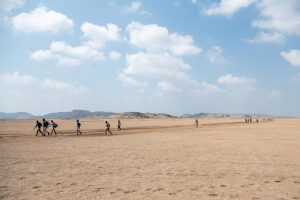
Ethiopia joined the BRICS alliance a year ago, alongside Egypt, Iran, and the United Arab Emirates, marking a major diplomatic achievement as the country enjoys steady economic growth. The Ethiopian government reaffirmed its commitment to collaborate with international partners, emphasizing that the BRICS+ membership will strengthen relations with rapidly growing economies within the bloc.
The Kazan Summit in 2024 was the first meeting attended by the new BRICS+ members, including Ethiopia. A delegation led by Foreign Affairs State Minister Misganu Arga (Amb.) participated in the 4th Sherpas/Sous-Sherpas meeting held in Kazan, Russia. The 16th BRICS Summit, which closed with the theme “Strengthening Multilateralism for Just Global Development and Security,” underscored the bloc’s focus on global reforms.
In a message delivered at the summit, Prime Minister Abiy Ahmed (PhD) highlighted the importance of BRICS, noting that its members represent nearly half of the world’s population and over a third of global GDP. Abiy emphasized that BRICS is well-positioned to drive sustainable global development and promote economic growth.
“To unlock this potential, global governance structures must become more inclusive and responsive to the needs of developing and emerging economies,” Abiy stated. He criticized the current international financial system, calling for comprehensive reform to create a more equitable framework. He also urged BRICS to lead by example, fostering mutually beneficial cooperation that supports not only its members but also the development goals of other emerging economies.
Abiy pointed to Ethiopia’s fast-growing economy as a valuable opportunity for BRICS nations to invest and collaborate in areas like trade and agriculture. Ethiopia’s vast natural resources and strategic access to African markets position it as a key partner in the bloc’s economic strategy, he added.
Echoing the Prime Minister’s message, National Bank of Ethiopia Governor Mamo Mihretu stressed the need for an effective multilateral system. “The current system doesn’t reflect today’s reality. For instance, no African country holds a permanent seat on the UN Security Council, which has real-world consequences,” he noted. Mamo also criticized the IMF’s voting structure, pointing out that small Western nations have more influence than large developing countries like China and India, distorting financial governance.
“We need better representation in global financial institutions,” Mamo stressed, adding that Ethiopia’s IMF quota is inadequate and does not reflect its economic progress. He called for reforms that would enhance access to international financing for developing nations.
Chinese President Xi Jinping expressed China’s commitment to working with BRICS countries to advance high-quality cooperation and promote unity among Global South nations. Xi emphasized the goal of building a shared future for mankind through collective progress.
Political-economic analyst Lawrence Freeman highlighted the bloc’s efforts to develop an independent BRICS payment system to reduce reliance on Western financial networks. BRICS Pay, currently under development, aims to function as a decentralized payment messaging system, providing an alternative to SWIFT.
With Ethiopia’s growing involvement in BRICS, the country is poised to play a key role in global economic reform while reaping the benefits of new trade and investment opportunities.
BY HAILE DEMEKE
THE ETHIOPIAN HERALD FRIDAY 25 OCTOBER 2024





